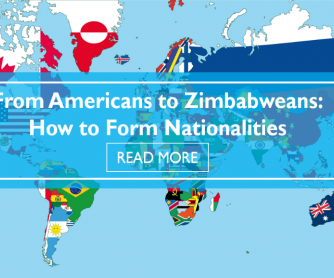
One question your students are likely to answer many times throughout their lives is "Where are you from?" Another might be, "What is your nationality?" Knowing how to answer this question in English or describe the nationalities of other people they know can sometimes be tricky. Thankfully, there are a few simple rules students learn to express their nationalities with pride.
Rules for Determining Nationality
Countries that End with -IA
In countries that end with -IA, you say the nationality with -IAN at the end. For example, a person from Croatia is Croatian. A person from bulgaria is Bulgarian.
Countries that End with -A
In countries that end with -A, like America, you either add -AN or -IAN to the end. For example, people from America are American, but people from Canada are Canadian. People from Ghana are Ghanaian, but people from Andorra are Andorran.
Countries that End with -STAN
In countries that end with -STAN, the way to pronounce the nationality can vary. In countries like Pakistan, Kyrgyzstan, or Kazakhstan, you simply add an i to tne end of the name (Pakistani, Kyrgyzstani, Kazakhstani). However, in some countries, such as Afghanistan, your shorten the name, so a person from Afghanistan is Afghan.
Countries that End with -AN/-EN/-IN
Similar to countries that end with -STAN, in most countries that end with -AN/-EN/-IN, you add an i to the end to form the nationality. For example, someone from Azerbaijan is Azerbaijani. Someone from Yemen is Yemeni. However, not all countries follow this rule. For example, people from Iran are Iranian, people from Bhutan are Bhutanese, and people from Sweden are Swedish.
Countries that End with -LAND
In countries that end with -LAND, the way you form the nationality varies. A person from Iceland is Icelandic, while a person from Finland is Finnish and a person from Switerzland is Swiss. When in doubt, however, choose to end the nationality with -ISH as people from Ireland are Irish, people from Poland are Polish or just take off the ending all together, as people from Swaziland are Swazi and people from Thailand are Thai.
Countries that End with -Y
In most countries that end with -y, you form the nationality by making the final sound -an or -ian. For example, people from Hungary are Hungarian, people from Italy are Italian, and people from Paraguay are Paraguayan. However, there are some exceptions. People from Norway are Norwegian, people from Germany are German, and people from Turkey are Turkish.
Nationalities that End with -ESE
In addition to forming nationalities based on the ending of a country's name, there are a handful of countries where the nationality ends in -ese. For example, a person from China is Chinese. A person from Burma is Burmese. A person from Japan is Japanese. A person from Portugal is Portuguese.
Multinational States
In some countries, nationality is not determined by the name of the country, but rather the ethnic or cultural group a person originates from. For example, someone from Uzbekistan is only an Uzbek if he/she is a native of that group.
Practice Makes Perfect
When it comes to learning nationalities, the best way to help students is to practice. You can have students practice introducing themselves as if they are from different countries.
- Hello, my name is _____________________. I am from _______________________. I am ____________________________.
You can also set up a game where you print out pictures of the flags or names of different countries and have students guess the nationalities of the people who are from there.
Of course, you can also just regularly drill nationalities with students if you find that learning nationalities is something you really want to focus on in your classroom. If you need help figuring out a nationality, reference our handy list below.
| Country | Nationality | Country | Nationality | Country | Nationality |
| Afghanistan | Afghan | Denmark | Danish | Lebanon | Lebanese |
| Albania | Albania | Djibouti | Djiboutian | Lesotho | Mosotho |
| Algeria | Algerian | Dominica | Dominican | Liberia | Liberian |
| Andorra | Andorran | Ecuador | Ecuadorian | Libya | Libyan |
| Angola | Angolan | Egypt | Egyptian | Liechtenstein | Liechtensteiner |
| Antigua and Barbuda | Antiguan/Barbudan | El Salvador | Salvadoran | Lituania | Lithuanian |
| Argentina | Argentinian/Argentine | Equatorial Guinea | Equatorial Guinean | Luxembourg | Luxembourger |
| Australia | Australian | Eritrea | Eritrean | Macau | Macanese |
| Azerbaijan | Azebaijani | Estonia | Estonian | Macedonia | Macedonian |
| Armenia | Armenian | Ethiopia | Ethiopian | Madagascar | Malagasy |
| The Bahamas | Bahamian | Fiji | Fijian | Malawi | Malawian |
| Bahrain | Bahraini | France | French | Malaysia | Malaysian |
| Bangladesh | Bangladeshi | Gabon | Gabonese | Maldives | Maldivian |
| Barbados | Barbadians | Gambia | Gambian | Mali | Malian |
| Belarus | Belarusian | Georgia | Georgian | Malta | Maltese |
| Belgium | Belgian | Germany | German | Marshall Islands | Marshallese |
| Belize | Belizean | Ghana | Ghanaian | Mauritania | Mauritanian |
| Benin | Beninese | Greece | Greek | Mexico | Mexican |
| Bhutan | Bhutanese | Grenada | Grenadian | Micronesia | Micronesian |
| Bolivia | Bolivian | Guatemala | Guatemalan | Moldova | Moldovan |
| Bosnia and Herzegovina | Bosnian | Guinea | Guniean | Monaco | Monegasque |
| Botswana | Motswana | Guyana | Guyanese | Mongolia | Mongolian |
| Brazil | Brazilian | Haiti | Haitian | Montenegro | Montenegrin |
| Brunei | Bruneian | Honduras | Honduran | Morocco | Moroccan |
| Bulgaria | Bulgarian | Hong Kong | Hong Kongers | Mozambique | Mozambican |
| Burkina Faso | Burkinabe | Hungary | Hungarian | Namibia | Namibian |
| Burma | Burmese | Iceland | Icelandi | Nepal | Nepalese |
| Burundi | Burundian | India | Indian | Netherlands | Dutch |
| Cambodia | Cambodian | Indonesia | Indonesian | New Zealand | New Zealander |
| Cameroon | Cameroonian | Iran | Iranian | Nicaragua | Nicaraguan |
| Canada | Canadian | Iraq | Iraqi | Niger | Nigerien |
| Cabo Verde | Cape Verdean/Cabo Verdean | Ireland | Irish | Nigeria | Nigerian |
| Centrial African Republic | Central African | Israel | Israeli | Norway | Norwegian |
| Chad | Chadian | Italy | Italian | Oman | Omani |
| Chile | Chilean | Jamaica | Jamaican | Pakistan | Pakistani |
| China | Chinese | Japan | Japanese | Palau | Palauan |
| Colombia | Colombia | Jordan | Jordanian | Panama | Panamanian |
| Comoros | Comoran | Kazakhstan | Kazakhstani | Paraguay | Paraguayan |
| Congo | Congolese | Kenya | Kenyan | Peru | Peruvian |
| Costa Rica | Costa Rican | Kiribati | I-Kiribati | Philippines | Filipino |
| Cote d'Ivoire | Ivorian | North or South Korea | Korean | Poland | Polish |
| Croatia | Croatian | Kosovo | Kosovar/Kosovan | Portugal | Portuguese |
| Cuba | Cuban | Kuwait | Kuwaiti | Qatar | Qatari |
| Curacao | Curacao | Kyrgyzstan | Kyrgyz | Romania | Romanian |
| Cyprus | Cyprian | Laos | Laotian | Russia | Russian |
| Czechia | Czech | Latvia | Latvian | Rwanda | Rwandan |
P.S. If you enjoyed this article, please help spread it by clicking one of those sharing buttons below. And if you are interested in more, you should follow our Facebook page where we share more about creative, non-boring ways to teach English.








